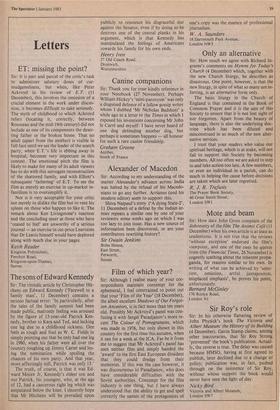Letters
ET: missing the point?
Sir: It is part and parcel of the critic's task to administer salutary doses of cur- mudgeonliness, but when, like Peter Ackroyd in his review of E.T. (11 December), this involves the omission of a crucial element in the work under discus- sion, it becomes difficult to take seriously. The myth of childhood to which Ackroyd refers (locating it, correctly, between Rousseau and the mid-19th century) did not include as one of its components the deser- ting father or the broken home. That no adult (apart from the mother) is visible in full face until we see the leader of the search party, when E.T.'s life is ebbing away in hospital, becomes very important in this context. The emotional pitch the film is likely to make for many of its adult viewers has to do with this surrogate reconstruction of the shattered family, and with Elliott's subsequent `fathering' of E.T. To see the film as merely an exercise in up-market in- fantilism is to oversimplify it.
Nor is it very acceptable for your critic not merely to dislike the film but to vent his spleen on those who happen to like it. The remark about Ken Livingstone's reaction and the concluding sneer at those who have `ceased to feel' are unworthy of a serious journal — an exercise in cut-price Leavisism that Dr Leavis himself would have deplored along with much else in your pages.
Keith Reader
KingSton Polytechnic, Penrhyn Road, Kingston-upon-Thames, Surrey


































 Previous page
Previous page